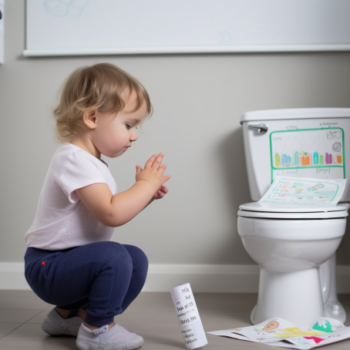Nighttime potty training can be a difficult process for parents and children alike. If you're struggling to help your son stay dry through the night, there are several effective strategies you can try. First, make sure he understands the importance of using the bathroom before bed and limiting his fluid intake before bedtime. Consider using a bedwetting alarm or rewarding him for dry nights. Additionally, creating a consistent bedtime routine and providing comfort items like a nightlight or stuffed animal can help him feel more secure and confident. With patience and persistence, you can help your son achieve nighttime potty training success.
Tag: bedwetting
Knowing the Right Time to Stop Using Diapers with Your Child – All You Need to Know
As a parent, it can be difficult to know when it's time to transition your child out of diapers. While every child is different, there are certain signs that indicate they may be ready to start using the toilet. These include being able to communicate their needs, having longer periods of dryness, and showing an interest in the toilet. It's important to remember that potty training is a process and may take some time. It's also important to be patient and supportive during this transition. By following your child's cues and offering encouragement, you can help them successfully make the move from diapers to the toilet.
Effective Nighttime Potty Training Tips: A Comprehensive Guide for Parents
Nighttime potty training can be a challenging task for both parents and children. It requires patience, consistency, and a lot of preparation. To start, make sure your child is ready and show them how to use the potty properly. Limit liquid intake before bedtime and make sure your child uses the bathroom before sleeping. Invest in waterproof sheets and consider using absorbent training pants or bedwetting alarms to help your child wake up when they need to use the bathroom. Remember to praise and encourage your child for their progress and be patient as nighttime potty training can take some time. By following these tips and maintaining a positive attitude, you'll be on your way to successful nighttime potty training for your child.
Potty Training Timeline: How Long Does It Take to Successfully Train a Child?
Potty training is a significant milestone for both parents and children. However, the duration of the process varies for different children. Some may take a few days, while others may need several months or even longer. Factors such as age, temperament, and readiness play a crucial role in determining how long it takes to potty train a child. Nevertheless, it is important to be patient and consistent in the process, as pushing a child too hard or rushing them can lead to regression. With the right approach, encouragement, and rewards, most children can successfully transition from diapers to using the toilet in due time.
A Comprehensive Guide to Determine Your Child’s Potty Training Readiness
Potty training is an important milestone in a child's development, but it can be challenging for both the child and parent. It's important to know if your child is ready before starting the process. Some signs that your child may be ready include showing interest in the potty, being able to stay dry for a few hours, and being able to communicate their needs effectively. It's important to be patient and positive during the process, as every child is different and may take longer to master this skill. By following your child's cues and providing plenty of encouragement and support, you can help them successfully navigate this important stage in their development.


